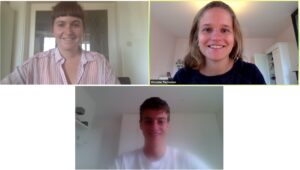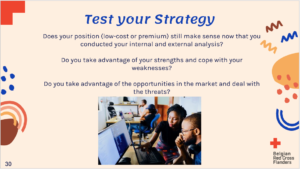Vlerick Students helping to shape the future of Commercial First Aid in Sub-Saharan Africa
Since 2015, Rode Kruis-Vlaanderen (Red Cross Flanders) has collaborated with Vlerick Business School to support its international capacity building programmes in Sub-Saharan Africa. Every year, a small group of Vlerick students is dispatched to one of the partner countries of Rode Kruis-Vlaanderen to work on a wide variety of different projects.
Despite the ongoing CoVID-19 crisis, this year was no exception. While the Vlerick team worked remotely, they were tasked with developing an evidence-based and contextualised Business Game to train the employees of various Commercial First Aid (CoFA) departments associated with the various African Red Cross Societies with whom Rode Kruis-Vlaanderen has a partnership. Our students happily explain how their In-Company Project came to life and how they brought it to a successful end…
The Beginning of our Journey
 Before we start describing the challenge we had to tackle for Rode Kruis-Vlaanderen and the solution we came up with, we would like to briefly introduce ourselves. We are Victoire, Olivier and Leen. A team of three students finalising our Masters in International Management & Strategy at Vlerick Business School. Together, we were fortunate enough to be selected by Rode Kruis-Vlaanderen to work on their challenge for the duration of our In-Company project.
Before we start describing the challenge we had to tackle for Rode Kruis-Vlaanderen and the solution we came up with, we would like to briefly introduce ourselves. We are Victoire, Olivier and Leen. A team of three students finalising our Masters in International Management & Strategy at Vlerick Business School. Together, we were fortunate enough to be selected by Rode Kruis-Vlaanderen to work on their challenge for the duration of our In-Company project.
Our story begins several months ago on the Vlerick campus with a presentation from Arjan Keijser, not only a Vlerick alumnus himself, but also our future Red Cross supervisor. During this short presentation, all students from our programme were introduced to the amazing work done by Rode Kruis-Vlaanderen abroad and the philosophy of evidence-based practice that underpins all of it.
After a highly selective recruitment process, we were able to kick off our project mid-April. Under the guidance of Arjan Keijser, Project Manager First Aid Blended Learning, our task was to develop an interactive Business Game that Rode Kruis-Vlaanderen can use to teach the employees of local CoFA departments the basics of running successful commercial organizations.
The importance of Commercial First Aid
You might wonder why Rode Kruis-Vlaanderen is offering support for the development of commercial operations to its Red Cross partners in Sub-Saharan Africa. It is a valid question to raise, as the various Red Cross Societies are primarily humanitarian actors tasked with providing essential services to the populations they serve.
This mission however, does not preclude the Red Cross from engaging in commercial activities. Indeed, in Flanders the Red Cross is a well-known provider of Commercial First Aid trainings to companies. Commercial activities like this allow the various Red Cross Societies around the world to leverage their expertise and achieve a degree of financial sustainability that would otherwise elude them.
Rode Kruis-Vlaanderen therefore supports other National Societies in setting up such revenue-generating activities. By supporting our African partners like this, they are able to create a sustainable form of financing which strengthens their resilience and makes them less dependent on government subsidies, donations, and Western funding to finance their much needed humanitarian work.
The Commercial First Aid Business Game
Running such a CoFA department is not an easy task however and requires the right mixture of soft and hard skills. No one is born with these skills, they have to be acquired through hard work. That is exactly where our project comes: develop a Business Game with a focus on Commercial First Aid.
For the Commercial First Aid Business Game to succeed, Rode Kruis-Vlaanderen also defined seven specific requirements for us to take into account during the development process:
- Relevant to our target audience and goal.
- Based on the latest scientific insights in the fields of education, communication sciences and economics.
- Highly interactive, hands-on and varied.
- Gender-neutral and appropriately contextualised to the Sub-Sahara African countries in which Rode Kruis-Vlaanderen is active.
- Inexpensive and low-tech, so that it could even be played without internet and/or regular access to electricity.
- Highly modular and scalable, as it must be possible for the facilitators to adapt the game to the specific needs of participants, environment and timeframe.
- Able to allow for clear measurement of the progress and working points of participants.
These seven principles had to be translated into (at the very least) a clear manual for instructors, a booklet with key take-aways for participants and slide decks and other supporting materials to use while teaching the various modules. With these objectives firmly established, we hit the ground running. We started by conducting research into the organisational context in which the game would take place. Up next was a deep dive into the academic literature around gamification, business games, social enterprises, and education in Africa, to meet the BRC-FL’s high standards for using only evidence-based tools. To supplement this literature review, we conducted interviews with experts in the aforementioned topics, and with representatives of National Societies from Eswatini, Lesotho, Malawi, Mozambique, Zambia and Zimbabwe.
With these objectives firmly established, we hit the ground running. We started by conducting research into the organisational context in which the game would take place.
From these interviews, it soon became clear that we needed to create modules on Human Resources, Strategy, Marketing, Accounting, Sales, and Negotiation. After identifying key learning objectives for each module, we transformed these learnings into a variety of game formats ranging from simulations to role-plays and case studies. The next step was writing the overall storyline of the Business Game, which formed the connective tissue between the various modules. This storyline had to be as realistic as possible to maximise the participants’ engagement and motivation. We eventually came up with a simulation in which the participants build a new CoFA department from scratch and have to grow their business. By the end of the week, the participants would be able to see which team ran their newly developed CoFA department in the best way.

Once the modules were ready, we validated these through extensive user-testing. Playing the various modules with representatives of the African National Societies we had interviewed allowed us to tailor the content and style of the CoFA Business Game even more to the needs of their end-users. To enable future incremental improvements to our Business Game, we also developed a system of surveys to measure the learning outcomes and identify areas of improvement.
The End of our Journey
For the past two months, we have been hard at work developing our materials. In the end, we delivered over 265 pages of instructor guidelines and participant booklets, a methodological report of 88 pages, nine different slide decks (247 slides in total), four surveys and twelve types of extra tools and templates that the participants can take home with them to implement and optimize their business procedures. Collaborating with Rode Kruis-Vlaanderen has been an insightful experience for us and the ideal steppingstone to finalise our education in International Management & Strategy.
We were particularly impressed by the commitment of Rode Kruis-Vlaanderen to leverage their expertise to aid the Sub-Saharan African National Societies and we also greatly appreciated the dedication shown by the Red Cross staff to the success and wellbeing of our team. Next to this, we highly appreciated working on a concrete project that will go on to have tangible impact for many years to come. It was immensely satisfying to see how our work was received with a lot of enthusiasm by the representatives of the various African National Societies we interviewed.




